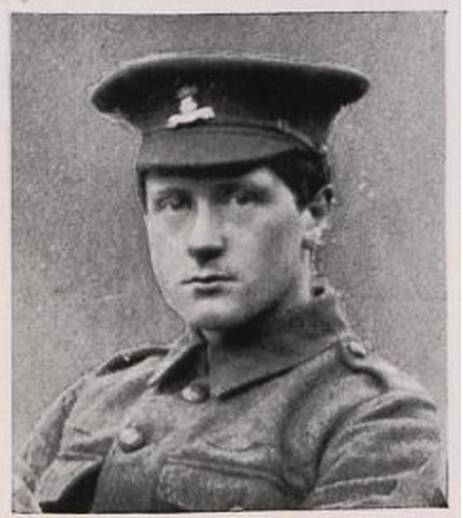Harold Brendan Brooks, class '09
In Memoriam

-
Harold was the youngest of seven by the name of Brooks who attended the College from Killarney, following in the footsteps of Charles ('01), Frederick ('98), George ('97), Thomas J.J. ('95), James ('95) and John A. ('93). The Chronicles over the years always refer to them as “five brothers” so it's not clear if in fact were seven or if two were cousins or unrelated, and if so it's also unclear who those two are! A second generation also followed for Thomas, who had a long and distinguished career with the National Bank, sent two sons: James, class '25 and Kevin, class '39.
In any case Harold, though the youngest was the first to perish, for 8 August 1915, aged 21, he was sadly killed in action during the Gallipoli campaign. Thomas Dillon, the noted historian from Listowel has done much research on ‘Kerry and the Dardanelles’ and with his kind permission, the Union is honoured to reproduce the below extract relating to Harold Brendan Brooks.
Requiescat in Pace.
Harold Brendan Brooks from Killarney was the sole Kerry casualty among the Dublin Pals (7th Battalion, Royal Dublin Fusiliers) at Suvla Bay. Nicknamed Laddie, he was the youngest son of Thomas James Brooks formerly the manager of the Royal Victoria Hotel and later Lakelands, Killarney. His family ran the Royal Victoria Hotel for over forty years, keeping a herd of Kerry Cattle while his father served on a Committee established in Killarney in the 1890s to promote the town as a tourist destination. His brother, John Arthur Brooks was a solicitor in Killarney. He was appointed by Colonel Maurice Moore as Adjutant to the Marquis MacSwiney and Inspector of the Irish National Volunteers in County Kerry.
Harold was educated at Castleknock College and had worked for a time at his father’s hotel in Killarney, the Royal Victoria Hotel. Before he volunteered in August 1914, he was employed with the Allan Line who operated the transatlantic Royal Mail Steamers to North America (Boston, Philadelphia, New York from Glasgow, Londonderry, Belfast, Liverpool and London. As an assistant purser, he would have been responsible for handing money on board the ships.
 When the war broke out, Frank Browning, President of the IRFU set up a Volunteers corps at Lansdowne Road Stadium for home defence known as the Irish Rugby Football Union Volunteers. Over 300 men answered his call to the rugby players and members of sports clubs in the capital to join in August 1914. He engaged a drill sergeant and every evening after work, the recruits who were mostly from the business and commercial classes were drilled and learned basic military skills. D Company of the 7th Royal Dublin Fusiliers had been specifically set aside for those who wished to volunteer from the IRFU Volunteers which numbered over 500 men in September 1914. Weeks later, they were addressed at Lansdowne Road by its commander, Lt Col Downing when over 100 men volunteered on the spot with more following in the coming weeks and months. The insurance Companies and Banks in Dublin gave assurances to those who joined up that their jobs would be kept open for them, if they returned at all of course!
When the war broke out, Frank Browning, President of the IRFU set up a Volunteers corps at Lansdowne Road Stadium for home defence known as the Irish Rugby Football Union Volunteers. Over 300 men answered his call to the rugby players and members of sports clubs in the capital to join in August 1914. He engaged a drill sergeant and every evening after work, the recruits who were mostly from the business and commercial classes were drilled and learned basic military skills. D Company of the 7th Royal Dublin Fusiliers had been specifically set aside for those who wished to volunteer from the IRFU Volunteers which numbered over 500 men in September 1914. Weeks later, they were addressed at Lansdowne Road by its commander, Lt Col Downing when over 100 men volunteered on the spot with more following in the coming weeks and months. The insurance Companies and Banks in Dublin gave assurances to those who joined up that their jobs would be kept open for them, if they returned at all of course!
Harold was one who answered that call and as he started his training at the Curragh, he was offered a commission as an officer in the Dublin Pals but he turned it down and served instead as a private. During the landing at Suvla Bay on the 7th August, he was hit in the right shoulder and died the following day. He was just 21 years old.
Out of the 239 men who served in the Dublin Pals, only 79 came back alive from Gallipoli. A memorial to the Dublin Pals and Irish rugby players who lost their lives in the First World War was later erected at Lansdowne Road Football Stadium, and is now is the only part of the original structure remaining.
